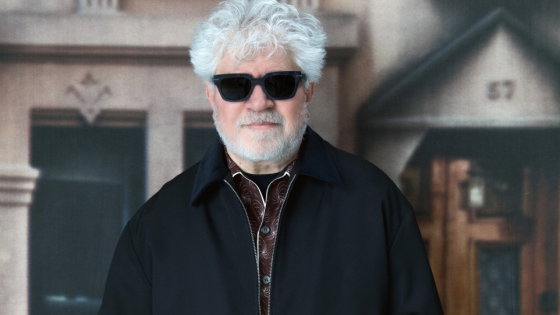Fresh from winning the Golden Lion at the Venice Film Festival for his English-language debut “The Room Next Door,” Spanish auteur Pedro Almodovar moved closer to home to the San Sebastian Film Festival — a festival very close to his heart — to celebrate both the film and his receiving of the event’s highest honor, the Donostia Award for career achievement.
Speaking at the press conference on Thursday, Almodovar said that his very first feature “Pepi, Luci, Bon” first premiered at San Sebastián in 1980 and that since arriving at the festival on Wednesday — which also happened to be his 74th birthday — he’d been overwhelmed with an “just an enormous amount of emotion” as he reflected on 44 years of filmmaking since then and the impact the festival had had on his career.
“I couldn’t stop crying and had tears running down my cheeks,” he said. “It’s been much more emotional that I expected — almost excessively emotional.”
Almodovar noted that “Pepi, Luci, Bon” — which attracted attention for its mix of melodrama, Movida modernity and a golden rain scene plus a fart-to-perfume commercial created by its protagonist, who works at an ad agency — was a “very defective film.” But he said it was also “the beginning” for him and a career that would go on to span some 23 features.
“So when I arrived at the hotel yesterday, I realised that in these 44 years since, things had changed enormously, generally in the world but also in my life. But this city continues to provoke very deep emotions in me 44 years later.”
Almodovar claimed that he’d been recently asked by a journalist if he’d ever question his talent over the years. “But I never thought about my talent,” he said. “What I thought about what was that I have this vocation which is much more powerful than myself. So if I didn’t manage to make films, I’d be the saddest person in the universe.”
Across his trajectory of features — a library which has earned him multiple Oscars, BAFTAs and awards and honors around the world — Almodovar said that “some were better than others, but all of them are mine — they all belong to me and I think this is a privilege that, unfortunately, not all directors can say.” He added that, alongside his producer brother Agustín Almodóvar, with whom he founded the production company El Deseo, the two had always had the “desire to be autonomous and independent and to be the owners of what we did.”
At Venice, Almodóvar spoke passionately in defence of euthanasia. He returned to the theme at San Sebastian, noting Spain had legalised euthanasia in 2021, but broadened his focus to take in climate change, the political far right and immigration, denouncing the “barbarity” of Europe’s anti-immigration laws.
In “The Room Next Door,” John Tuturro plays a climate change doomsayer. Almodovar cited one line he has: ‘I’ve lost my faith in humanity.’ “If the right [gets into power], they will take decisions for us which are highly negative,” Almodovar said.
“Does this far-right think about their grandchildren and the world they’ll leave? Africa will be much more affected by climate change. Treating immigrants like invaders is a barbarity. This film talks about the value of empathy and opening one’s arms to others. Spain needs a larger labor force. Immigrants should be welcomed.”
In some respects, Almodóvar reflected, he has changed. He has moved, for instance, from melodramas to dramas. “It’s a question of biology,” he said. I’ve shot a lot of erotic films, if the scenes had a meaning, , but now its not so important for me to show two people making love. Contention for me means getting to larger purity. From ‘Julieta,’ my films are lesser baroque. Contention is not in my nature, but “The Room Next Door” is serious, almost funeral. I’ve tried not to be sentimental, not use melodrama.”
Some things don’t change, however. “The key is spontaneity. I didn’t make the films Spain wanted at the beginning. They weren’t big box office hits. But being yourself is key.”
While Almodóvar may have been the star attraction at the press conference, his “The Room Next Door” star Tilda Swinton was given the opportunity to talk about working with the filmmaker across two films, something she said was “very happy” to do.
“I’m sitting here beside him thinking, what a magical blessing in my life it is to have found him,” she said. “I have known him less long than other people at this table, less long than many of you in this room, but he’s already an absolutely central part of my life, not only to do with the my daily life, but also he’s such an endorsement of everything that made me a filmmaker in the first place.”
Swinton described Almodovar as a “pirate” and that there were many people “who want pirates” (also, she added, “not piracy”).
“He’s like a young filmmaker. He makes a film with all the gusto and passion and is present in a way that I think very many filmmakers are encouraged to give up. And we audience, we want that. We want that feeling of presence in a filmmaker,” she said. “So when a young audience, and there are many more coming along the road who are yet to be born, what they will find in Pedro’s cinema, 23 of his films so far, is this young spirit, this absolute, dauntless passion and desire and belief in cinema as a source of notion. He’s a real lover of cinema, and that’s what the audience wants, particularly a young audience.”
As Swinton concluded, to applause: “So Pedro forever, frankly.”
Source Agencies


